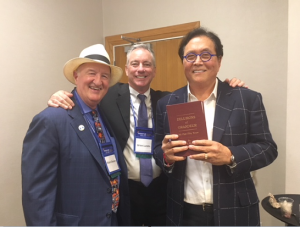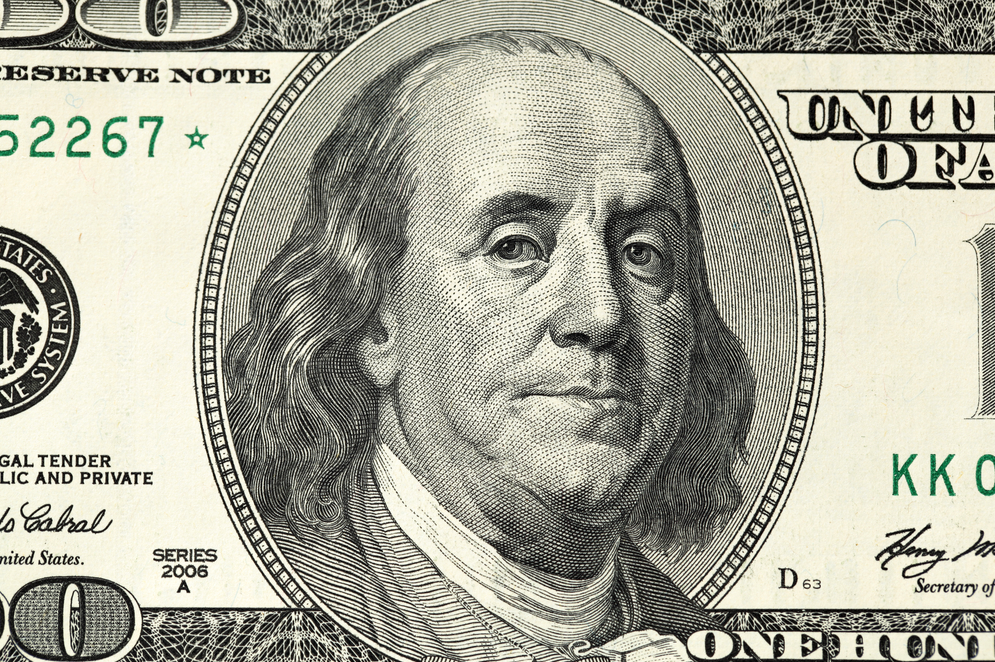“Benjamin Franklin never tired of preaching the doctrine of saving. But… the old virtues may be modern sins.” – Paul Samuelson, Economics
“Savers are losers.” – Robert Kiyosaki, Rich Dad Poor Dad
As a direct descendant (eighth generation) of Benjamin Franklin, the father of American capitalism, I’m always defending the virtue of thrift.
Since 1948, when MIT economist Paul Samuelson popularized the supposed benefits of deficit spending, progressive taxation and the consumer society of Keynesian economics, the classical virtues of saving, balanced budgets and limited government have been on the defensive.
In Poor Richard’s Almanac, Franklin made famous the maxim, “A penny saved is a penny earned,” or words to that effect (the actual quote is “A penny spar’d is twice got”). What he meant was if you save $100, it’s as if you earned $100 working… only you didn’t have to work for it.
In 1757, Franklin published his final Poor Richard’s Almanac titled “The Way to Wealth,” where he outlined three grand principles to financial success: industry, thrift and prudence. (It’s still in print today.)
He wrote, “The way to wealth is as plain as the way to market. It depends chiefly on two words, industry and frugality: that is, waste neither time nor money, but make the best use of both. Without industry and frugality nothing will do, and with them everything.”
Franklin’s sound advice is echoed in George Clason’s 1926 classic – and perennial best-seller – The Richest Man in Babylon. I highly recommend it for all investors, young and old.
His motto is “A part of all you earn is yours to keep.” He recommends living within a budget, saving 10% and putting that savings to good use in business or investments. He is credited with the line, “Pay yourself first.”
But today many Keynesian economists and financial advisors say Franklin and Clason’s advice is old-fashioned.
According to Robert Kiyosaki, author of Rich Dad Poor Dad – the No. 1-selling financial book of all time with more than 26 million copies sold – this traditional view is obsolete. He is highly critical of those who advise, “Go to school, get a job, save money, get out of debt and invest for the long term in the stock market.”
He calls it the “poor dad strategy” for employees. Getting a college degree no longer guarantees you a good-paying job. Savings accounts pay very low interest rates and won’t make you rich. Retirees can’t depend on corporate pension plans, and 401(k) investments are risky – you can lose half your fortune if the stock market crashes. Social Security isn’t enough to live on, and besides, it’s going bankrupt. Owning a home is no sure way to riches – real estate prices can crash too. And even your job is at risk in today’s world of robotics and globalization.

Mark Skousen with Brien Lundin and Robert Kiyosaki
What to do?
Kiyosaki recommends the “rich dad approach” – create a successful business or be an active speculator, especially in rental properties. Both dramatically increase your chances of financial independence. Take on “good” debt and use that debt to your advantage. Moreover, the tax advantages for businesses and investors are much better than for full-time income earners.
Certainly most rich people – like those on the Forbes 400 Richest Americans – have followed the Kiyosaki formula. But what about the millions of hardworking, middle-class folks who aren’t interested in or well-suited for high-risk business ventures or entrepreneurship?
Fortunately, there is hope for the “poor dads” of the world. If you stay alert to new job opportunities and keep up to date on new skills, you can earn a lot as an employee. Focus on living below your means, avoiding consumer debt as much as possible, saving regularly, and most importantly, putting those savings to good use.
Invest in other people’s successful businesses by investing in the stock market through individual stocks and funds. Despite occasional bear markets and crashes, the long-term trend is up, and many passive investors have gotten rich in the stock market.
In sum, Ben Franklin’s virtues are still applicable today. Stay educated, stay out of personal debt, stay invested in the stock market… and you too can be a “rich dad.”
Franklin also said, “Investing in knowledge pays the best interest.”
Speaking of investing in knowledge, Robert Kiyosaki, Alexander Green, Marc Lichtenfeld and yours truly (along with 200 other experts in money, philosophy, politics and healthy living) will be at this year’s Fast Money Summit as part of FreedomFest, this July 11-14, at Paris Las Vegas. Read all about it here.
Keynote speakers include George Will, Rich Lowry, John Stossel, Judge Andrew Napolitano, Kennedy, Grover Norquist, Steve Forbes and Steve Moore.
Our entire schedule of speakers, panels and debates are now posted online. Check it out here.
Use the code EAGLE100 to get $100 off the registration fee. Click here to register or call 1.855.850.3733 (toll-free), ext. 202. Paris Las Vegas is offering a super discount for the hotel block, but it ends this weekend! Sign up today.
Good investing,
Mark
Mark Skousen is a true believer in reason, self-determination, hard work and liberty. Since 1980, Mark has been the editor-in-chief of the award-winning investment newsletter Forecasts & Strategies. He’s a successful author and publisher of several books, including The Maxims of Wall Street and Investing in One Lesson. He is also the founder of FreedomFest, an annual gathering in Las Vegas of the freedom movement from around the world.
